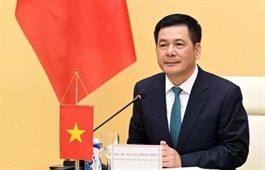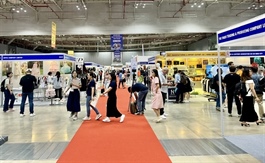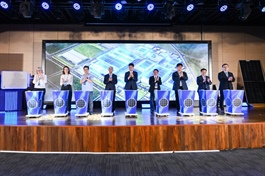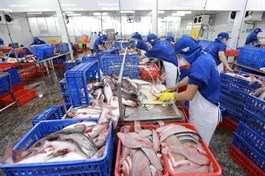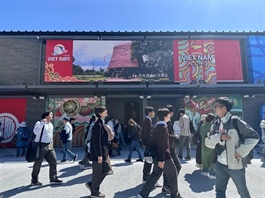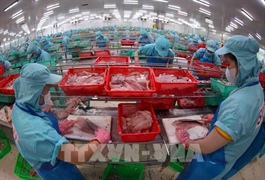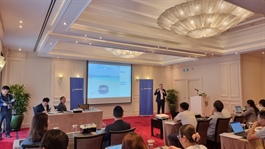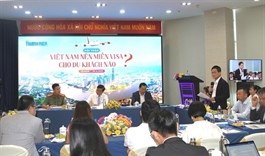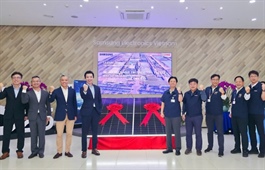Agriculture to benefit from digital tech
Agriculture to benefit from digital tech
The application of digital tech is seen as the key to developing sustainable agriculture, promoting efficient resource use, and enhancing productivity and quality.
During the Partnering for Green Growth (P4G) Summit in Hanoi last week, one ministerial session focused on the journey to transform the food system for a sustainable era.
The representatives of international organisations, state management authorities, and the business community looked at the crucial role of digital technology application in developing agriculture.
“The green revolution is not just about innovation. It’s about empowering people, protecting the planet, and ensuring no-one is left behind. Precision agriculture and digital platforms enable farmers to produce more with fewer resources, optimising yields, minimising wastewater, and focusing on the best use of limited resources,” said Donal Brown, associate vice-president at the International Fund for Agricultural Development.
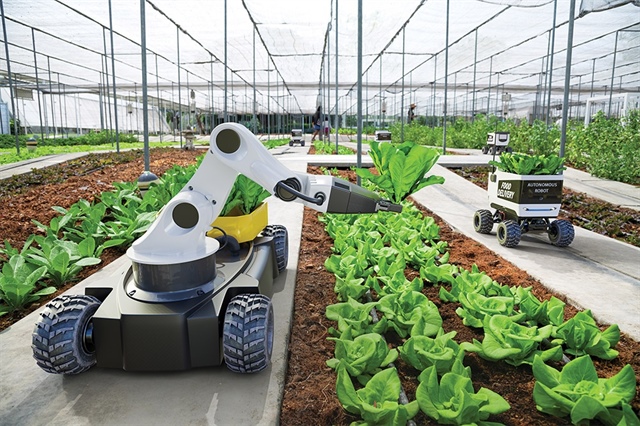
Tech like AI is being used to help farmers achieve better results, Photo: Shutterstock |
For example, biotechnology supports in growing crops for a more resilient climate, ensuring food security. In a new era of unpredictable weather patterns, smart water and soil management systems contribute to reducing waste and simultaneously ensure the ecosystems, paving the way for sustainable farming practices.
“Besides that, climate-smart farming methods that boost resilience while cutting emissions are considered essential, with examples like improved wet and dry techniques for rice farming,” added Brown.
In Vietnam, the Ministry of Agriculture and Environment is gradually implementing the transformation of agriculture towards green, smart, and sustainable practices.
To realise these targets, the government has issued several key strategies and national plans that cover the rest of this decade. In addition, players such as Tan Long Group, Vinamilk, VinEco, TH Group, and HAGL Agrico have pioneered the adoption of high technology in agricultural production.
Digital technologies are helping Tan Long Group improve operational efficiency, reduce costs, and optimise resource utilisation, according to CEO Truong Sy Ba at the P4G event.
“For example, the company is exploring AI and machine learning applications to analyse data from various sources such as cameras and sensors to assess animal health, stress, and welfare. This can help in early disease detection and optimising feeding and environmental conditions,” Ba said.
“The group uses technologies like GPS and soil sensors to optimise farming practices, ensuring efficient resource allocation and maximising crop yields. Digital technology is being used to monitor production processes, implement quality control measures, and ensure the high quality of finished products,” Ba added.
In the process of establishing sustainable and low-emission agriculture, Vietnam also receives the support of other countries and international organisations.
“We see a strong alignment between Ireland and Vietnam in the vision of our approach, and significant potential for partnerships that can help to drive transformation. One area of our cooperation has been in monitoring and evaluation, which is essential to guide evidence-based work,” said Deirdre Ní Fhallúin, Ambassador of Ireland to Vietnam.
Last year, Ireland worked with the former Ministry of Agriculture and Rural Development to roll out a monitoring and evaluation framework for food system transformation in Vietnam. The project focused on using AI to help farmers achieve higher yields by preserving soil and saving water in the context of environmental and climate pressures.
Another venture from the Irish focuses on transforming waste from the coffee industry into sustainable micro proteins.
Research and innovation in smart agriculture have made notable progress around Vietnam, but challenges remain. Most smallholder farmers and small enterprises face difficulties in accessing advanced technology due to constraints in capital and technical infrastructure.
“We recognise that innovation, with a focus on research and the application of modern science and technology, is the core to achieving gains in the agricultural sector. We also understand that no country can achieve success in transforming its food system alone. This journey requires collective action among nations, international organisations, businesses, scientists, and farmers,” said Do Duc Duy, Minister of Agriculture and Environment.
- 16:20 26/04/2025



